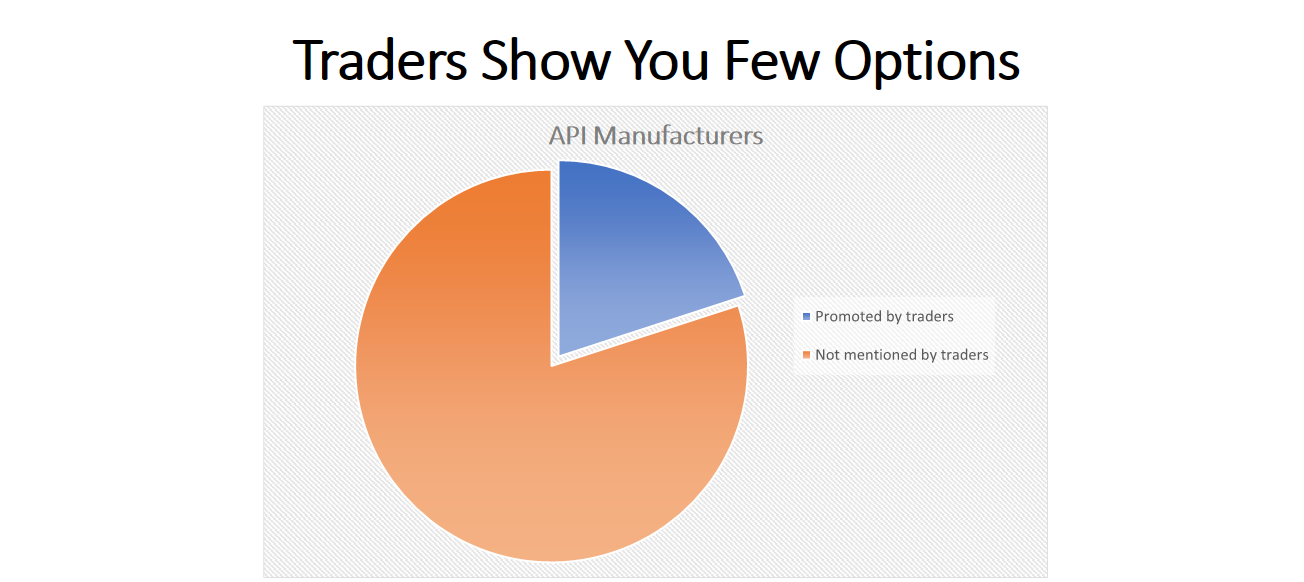When you procure your APIs through traders, are you really getting the best deal – or just the easiest option?
For small and medium-sized pharmaceutical companies, finding the right supplier for active pharmaceutical ingredients (APIs) is critical to the success of any new generic development project. Traders or importers often seem like the easy route—they offer ready-made supplier options, handle logistics, and promise to simplify the entire process. For companies with limited resources, it can feel like the most practical choice.

But relying on traders comes with hidden costs. From higher prices to limited supplier options and reduced control over your supply chain, the downsides often outweigh the convenience.
These are not just hypothetical risks — I have seen these challenges many times during my decades in the industry. Let’s look at how traders can complicate your sourcing efforts and why working directly with manufacturers can be a smarter, more cost-effective, and less risky alternative.
Why Relying on Traders Can Be Risky
1. Limited Supplier Options
In the API industry, there are almost always multiple manufacturers producing the same API. But here’s the issue: when you go through a trader, you may not even be aware of all the options available.
Traders typically work with only a few manufacturers — the ones offering them the most favorable contracts. When you rely on a trader to source an API, they will actively promote those manufacturers, even if they are not the best fit for your needs. Manufacturers the trader does not work with? They are left out of the conversation entirely. I have seen companies unknowingly pay 15-40% more for APIs through traders, when better, GMP-compliant options were available (but never offered).
What does this mean for you?
- You might never know that better suppliers exist — suppliers offering higher quality, lower prices, or better terms.
- Your sourcing decisions are influenced by the trader’s priorities, not by what is best for your business.

2. Higher Costs
Traders make their profit by adding a margin to the price of the APIs they source for you. That is standard business practice, but it does not always work in your favor.
Rather than negotiating the best deal for you, traders focus on securing the best margins for themselves. The result? You pay more than you need to, and cost-saving opportunities are overlooked.
For a small pharmaceutical company, every eurocent matters. And it is frustrating to see money going towards a trader’s margin instead of being reinvested in your business.
3. Lack of Control
When you work through a trader, all communication with the API manufacturer goes through them. This means:
- If delays, quality concerns, or documentation issues arise, you must go through the trader to get answers.
- Even after audits, where you meet the manufacturer directly, ongoing communication reverts to the trader.
This layer of separation can lead to delays, miscommunication, and unnecessary frustration.
But when you work directly with manufacturers, you regain control over your supply chain – control over pricing, quality and communication. And that control can be the difference between smooth operations and costly delays.

But Isn’t Working Directly with Manufacturers Too Difficult for Smaller Companies?
This is a common concern — and a valid one. Dealing with a lot of manufacturers directly requires expertise, connections, time, and diligence – resources which small companies do not always have or do not always want to allocate. But it is entirely possible, and it is becoming increasingly necessary to remain competitive.
What are the advantages of working directly with manufacturers?
- Transparency: You know exactly whom you are working with and can evaluate their processes, compliance, and reliability firsthand.
- Cost Savings: Without trader margins, you get access to more competitive pricing and keep more money in your budget.
- Stronger Relationships: Direct communication builds trust and more transparency, leads to better terms, and lays the foundation for long-term partnerships.
How We Can Help
Switching to working directly with manufacturers doesn’t have to be difficult. And let’s be clear—this is not about replacing one middleman with another.
Unlike traders, we do not act as intermediaries or profit from the APIs you buy. We do not buy APIs and sell them to you with a markup. We do not buy and sell APIs at all – instead, we are providing a service: we work as your independent partner to find the best manufacturers for your needs. Here’s how we do it:
- We identify manufacturers who meet your quality, compliance, and reliability requirements, ensuring full GMP compliance at every level.
- We negotiate on your behalf, not just for the lowest price, but for the best balance of cost, quality, and long-term value.
Our work is entirely transparent. We have no financial ties to the manufacturers we recommend. Our revenue comes solely from fixed service fees paid by our clients, agreed beforehand, so our focus stays on finding the best solution for you.
If you are not sure, that is okay. We understand. We are confident in the value we bring, which is why we offer the chance to experience our services without any commitment upfront, free-of-charge. Let us help you identify suppliers or evaluate options for one of your projects, and see the difference we can make.
Conclusion
Sticking with traders might feel like the easier choice, but it often comes with higher costs and unnecessary risks. By working with us to connect directly with the right manufacturers, you can save money, regain control, and unlock better options for your API supply chain.

